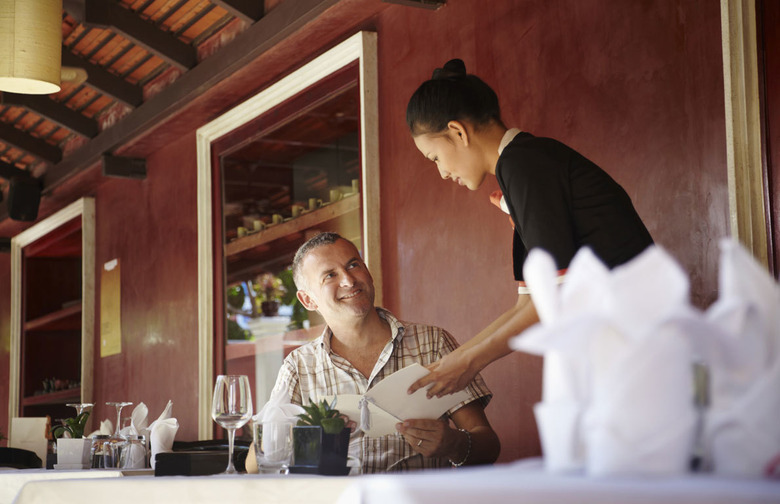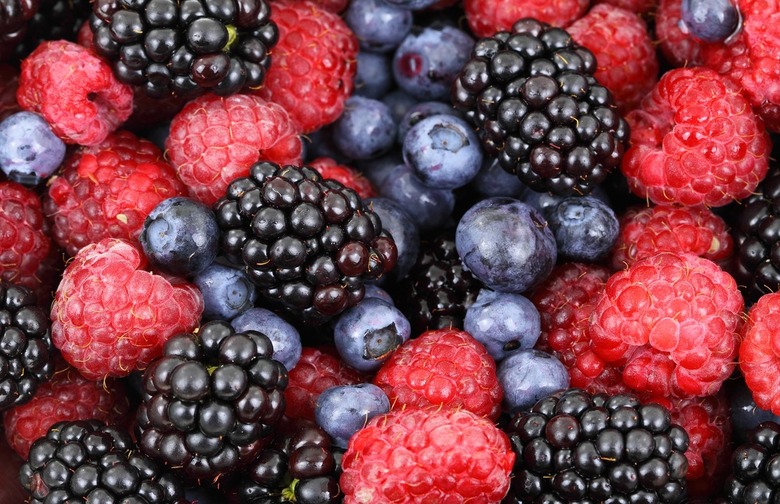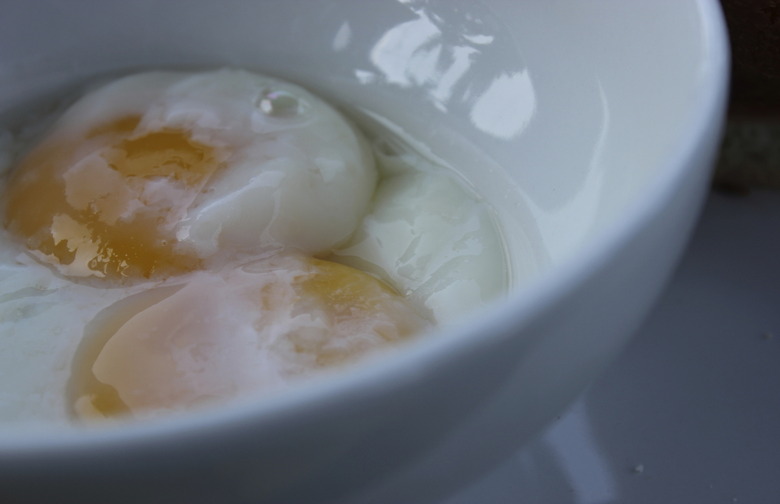13 Foods You Probably Shouldn't Eat When Traveling (Slideshow)
Berries
As a travel rule, originally laid out by Jodi Ettenberg of LegalNomads.com, you should only eat fruits that have a thick layer of skin that can be peeled away, such as bananas, oranges, or rambutans (if you happen to find yourself in Southeast Asia). That natural casing keeps the fruits fresh and clean, but you'd still be wise to wash the exteriors thoroughly before peeling, lest contaminants on the skins find their way onto the fruit itself. Fruits like berries, strawberries, and apples, on the other hand, should be avoided, because these fruits are exposed to bacteria from the water they are washed in, as well as the places where they are stored. And this probably goes without saying, but don't pick and eat any berries you find yourself. We don't care how purple and delicious they look.
Bootleg Booze
In America, drinking a craft beer or homemade brew is currently all the rage. In some parts of the country, moonshine and other similar spirits are quite popular as well. However, when traveling abroad, it's best to pass on the bootleg booze. The water source, storage location, production, and alcohol levels are all unknown to travelers, and this can cause some serious illness issues. If imbibing some libations with the locals, stick to drinking from bottles and cans.
Buffet Foods
You know all the reasons you might pass on the buffet at American restaurants? (Like lack of freshness, poor temperature regulation, attraction of flies and other insects, mixing of utensils, germs picked up from other diners, etc.) The same goes for buffets abroad, but now you also have to worry about basically every other item on this list when it is included amongst the buffet offerings. Stick to à la carte ordering, and you'll have a much better chance of avoiding these dangers.
Bush Meat
Although sampling exotic local delicacies is a big part of traveling abroad, you'd be wise to stay away from any so-called "bush meat," like monkeys, bears, and other wild game or undomesticated animals (even though Anthony Bourdain has done it). Raw bush meat is capable of transmitting diseases like Ebola from animals to humans. Even in cooked form the meat can still cause issues, especially for tourists whose bodies are unfamiliar with local bacteria. Also, unless you know a lot about animal species in the region, you'll want to stay away from any unfamiliar meat dishes — lest you accidentally eat an endangered species.
Fried Rice
Fried rice, a popular dish in many Asian countries, is often made with bits of meat scraps that are flash-fried with the grains. Because of this, you risk the possibility of the meat contaminating the rice — even if your dish doesn't actually contain pieces of meat! As for meat in general, we'll have more on that later.
Frozen Foods
This one isn't nearly as obvious. When food is frozen, melted a little, and then refrozen — as is the case with many frozen foods available around the world — it is more likely to develop harmful bacteria. This includes ice you might consider adding to your water or coffee. Be especially careful of this in countries where filtered water isn't widely available. This shouldn't be a huge issue, as other countries aren't nearly as crazy about ice as America, according to Smithsonian.com. However, this advice does include ice cream, so apologies to your sweet tooth. If you want to play it a bit safer, go with a sorbet, as the acidic qualities may help prevent bacterial growth.
Raw or Runny Eggs
The Center for Disease Control warns against eating raw or partially cooked eggs in its tips for travelers' health (unless you're Rocky Balboa). There are a few health risks involved in eating raw or runny eggs at home to begin with — as evidenced by the warning label in refrigerated cookie dough and the more than 11,000 egg-related salmonella cases in recent years — and the same amount of caution, if not more, should be used when eating raw eggs overseas. Please be aware that this applies to raw-egg-based sauces, too, like hollandaise.
Click here for some other facts you might not know about eggs.
Raw Vegetables
Almost every guidebook you open will tell you to forget eating salads when you're abroad. Why? It's all about the water used to wash the vegetables, as well as the conditions the vegetables are kept in; many countries do not have the resources to store fresh produce in refrigerators. Additionally, most leafy vegetables grow at ground level, and in countries with a lot of pollution, the soil could very easily be contaminated. According to FoodSafety.gov, you should eat vegetables only when they are cooked and still hot.
Even when at home, here are 9 foods you should never eat raw.
Restaurant Food During Off Hours
Street food is generally safer to eat than restaurant food, since you can see the food being made in front of you — but that doesn't mean you should avoid restaurants completely. According to The Food Traveler's Handbook, you should eat restaurant food at times when there are a lot of people around, which is usually during standard mealtimes. Though these schedules vary from country to country, you can be sure that sitting down for lunch at 3 p.m., when the options are limited and the food is lukewarm, will do your stomach no good.
Sauces and Condiments
While we understand how painful it is to say no to salsa, chutney, and other sauces when traveling, anything that so clearly includes water or fresh herbs as ingredients should immediately raise a red flag. As anyone who has ever had food poisoning can tell you, contamination is no joke, folks.
Soda
Don't let those tears fall quite yet, sodaholics. According to the CDC, you can drink soda abroad, but only if it comes in a sealed can or bottle. Soda from a fountain is an absolute no-no, as it can potentially contain tap or other water that has not been properly filtered. Even brushing your teeth with non-bottled water could leave you in intense pain, so drinking anything from a fountain is just not smart.
Then again, drinking soda is terrible for human health in general. Click here for 10 reasons.
Uncooked or Partially Cooked Meats and Seafood
Seafood is a bacteria hotbed when partially cooked, so you should probably say no to it when you travel, according to Esquire. This is especially true for bottom-feeders like lobster. Raw or partially cooked meat also puts you at high risk of infection, and you could even develop a tapeworm from it. Be sure to order meats thoroughly cooked, especially when the meat is ground; more surface area means a higher risk of bacteria (like E. coli) finding its way into your meal.
Click here for the 9 foods that are most likely to cause food poisoning.
Unpasteurized Dairy Products
We know it isn't easy to say "no" to soft cheeses like Camembert, but be careful. According to the FDA, raw, unpasteurized dairy can carry dangerous bacteria such as salmonella, E. coli, and listeria, and is a major cause of food-borne illness. Also, pasteurization processes vary from country to country. For example, in India, where health regulations are not as strict, it is common for households to boil milk and refrigerate it, just to make sure all the bacteria are killed. However, many restaurants skip this practice. If you're not witnessing it yourself, you're better off just avoiding dairy you aren't sure is properly pasteurized.
Click here to see the 15 of the most notorious food scares in history.













